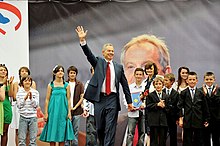
The Kosovo War was an armed conflict in Kosovo that lasted from 28 February 1998 until 11 June 1999. It was fought between the forces of the Federal Republic of Yugoslavia, which controlled Kosovo before the war, and the Kosovo Albanian separatist militia known as the Kosovo Liberation Army (KLA). The conflict ended when the North Atlantic Treaty Organization (NATO) intervened by beginning air strikes in March 1999 which resulted in Yugoslav forces withdrawing from Kosovo.

The Kosovo Liberation Army was an ethnic Albanian separatist militia that sought the separation of Kosovo, the vast majority of which is inhabited by Albanians, from the Federal Republic of Yugoslavia (FRY) and Serbia during the 1990s. Albanian nationalism was a central tenet of the KLA and many in its ranks supported the creation of a Greater Albania, which would encompass all Albanians in the Balkans, stressing Albanian culture, ethnicity and nation.

The North Atlantic Treaty Organization (NATO) carried out an aerial bombing campaign against the Federal Republic of Yugoslavia during the Kosovo War. The air strikes lasted from 24 March 1999 to 10 June 1999. The bombings continued until an agreement was reached that led to the withdrawal of the Yugoslav Army from Kosovo, and the establishment of the United Nations Interim Administration Mission in Kosovo, a UN peacekeeping mission in Kosovo. The official NATO operation code name was Operation Allied Force whereas the United States called it Operation Noble Anvil ; in Yugoslavia the operation was incorrectly called Merciful Angel, possibly as a result of a misunderstanding or mistranslation.

Operation Horseshoe was a 1999 alleged plan to ethnically cleanse Albanians in Kosovo. The plan was to be carried out by Serbian police and the Yugoslav army.

United Nations Security Council resolution 1244, adopted on 10 June 1999, after recalling resolutions 1160 (1998), 1199 (1998), 1203 (1998) and 1239 (1999), authorised an international civil and military presence in the Federal Republic of Yugoslavia and established the United Nations Interim Administration Mission in Kosovo (UNMIK). It followed an agreement by Yugoslav President Slobodan Milošević to terms proposed by President of Finland Martti Ahtisaari and former Prime Minister of Russia Viktor Chernomyrdin on 8 June, involving withdrawal of all Yugoslav state forces from Kosovo.
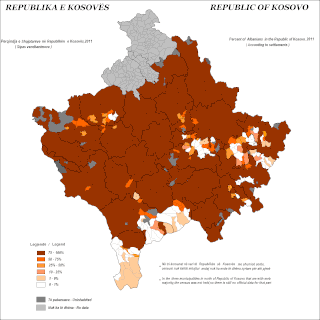
The Albanians of Kosovo, also commonly called Kosovo Albanians, Kosovan Albanians or Kosovars, constitute the largest ethnic group in Kosovo.

The Football Superleague of Kosovo, also known as the ALBI MALL Superleague of Kosovo for sponsorship reasons with Albi Mall, is the top level of the Kosovar football league system. The Superleague is organized by the Football Federation of Kosovo and the division currently has a 10-team format. The clubs play each other four times during the season for a 36-match schedule. At the end of the season, the bottom two teams in the division are relegated to the second tier, First Football League of Kosovo.

Football Club Prishtina, commonly known as Prishtina, is a professional football club based in Prishtina, Kosovo. The club plays in the Football Superleague of Kosovo. It is the most successful domestic club.

Klubi Futbollistik Liria Prizren, commonly known as Liria, is a professional football club based in Prizren, Kosovo. The club plays in the Kosovo Superleague, which is the top tier of football in the country. The club is one of the oldest and one of the most successful clubs in Kosovo.

The Fadil Vokrri Stadium, previously known as Pristina City Stadium, is a multi-purpose stadium in Pristina, Kosovo, which is used mostly for football matches and is the home ground of FC Prishtina and the Kosovo national football team. The stadium has a capacity of 13,980.
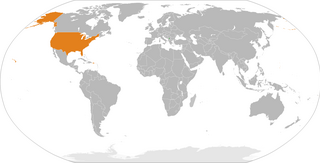
The United States officially recognized Kosovo as a country on February 18, 2008, one day after the Kosovar declaration of independence from Serbia. Since then, the two countries have maintained relations, with Kosovo considering the United States one of its most important allies. Kosovo has dedicated several monuments to American politicians deemed instrumental to the nation's independence, especially Bill Clinton. Most Kosovars consistently approve of the United States government, often posting the highest percentages in polls among European nations.

The Hunt: Me and the War Criminals is a book written by Carla Del Ponte, published in April 2008. According to Del Ponte she received information saying about 300 Serbs were kidnapped and transferred to Albania in 1999 where their organs were extracted. The book caused a considerable controversy with Kosovan and Albanian officials denying these allegations and Russian and Serbian officials demanding more investigation. ICTY stated no substantial evidence supporting the allegations was brought to the court.

Kosovo–Turkey relations are the historic and current bilateral relations between the Republic of Kosovo and the Republic of Turkey. Kosovo has an embassy in Ankara, whereas Turkey has an embassy in Prishtina. Both nations are predominantly Muslim, have close cultural and military ties, and both have sought to join the European Union.
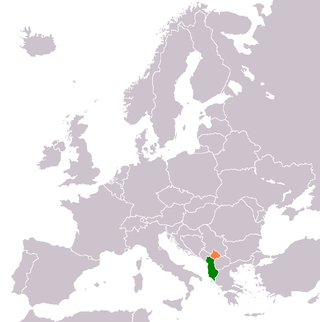
Albania–Kosovo relations refer to the current, cultural and historical relations of Albania and Kosovo. Albania has an embassy in Pristina and Kosovo has an embassy in Tirana. There are 1.8 million Albanians living in Kosovo – officially 92.93% of Kosovo's entire population – and Albanian is an official language and the national language of Kosovo. Likewise, the peoples of the two countries have practically identical traditions and folklore. Kosovo is the birthplace of Albanian nationalism such as the League of Prizren. In addition, the strong relations are highlighted in successive polls showing majority of ethnic Albanians in both states wanting unification. Both countries and their citizens refer to the relationship as "one nation, two states" as highlighted in the popular pan-Albanian slogan "Jemi një".

Australia–Kosovo relations refer to the bilateral relations of Australia and Kosovo. Kosovo and Australia officially established diplomatic relations on 21 May 2008. Kosovo has an embassy in Canberra, which was opened in February 2013. The Ambassador of Australia to Kosovo is subordinate to the embassy in Vienna.

The Battle of Junik was fought during the Kosovo War between the ethnic Albanian paramilitary organization known as the Kosovo Liberation Army (KLA) and the security forces of the Federal Republic of Yugoslavia over the town of Junik in western Kosovo.
This is a timeline containing events regarding the history of Kosovo.
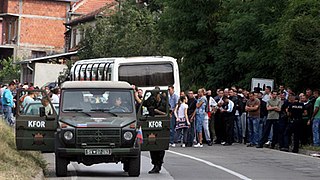
Clashes between the Republic of Kosovo and ethnic Serbs in northern Kosovo began on 25 July 2011 when the Kosovo Police crossed into the Serb-controlled municipalities of North Kosovo, to control several administrative border crossings. This was done without the Kosovo Police consulting either Serbia or Kosovo Force (KFOR)/EULEX. Though tensions between the two sides eased somewhat after the intervention of NATO's KFOR forces, they remained high amid concern from the European Union, which also blamed Kosovo for the unilateral provocation. On 19 April 2013, an agreement was signed in Brussels between representatives of Kosovo and Serbia. The 15-point document granted devolved powers to North Kosovo regarding economic development, education, healthcare and urban planning, and several mechanisms that allowed a certain autonomy in justice, policing and electoral matters.
Albanians in Belgium are Albanians that live in Belgium or are Belgians of Albanian descent. They number up to 60,000 people in Belgium. The vast majority emigrated from Serbia, Kosovo, Montenegro, North Macedonia and Albania.
Bler Thaçi is a Kosovar professional footballer who plays as a midfielder for KEK.
